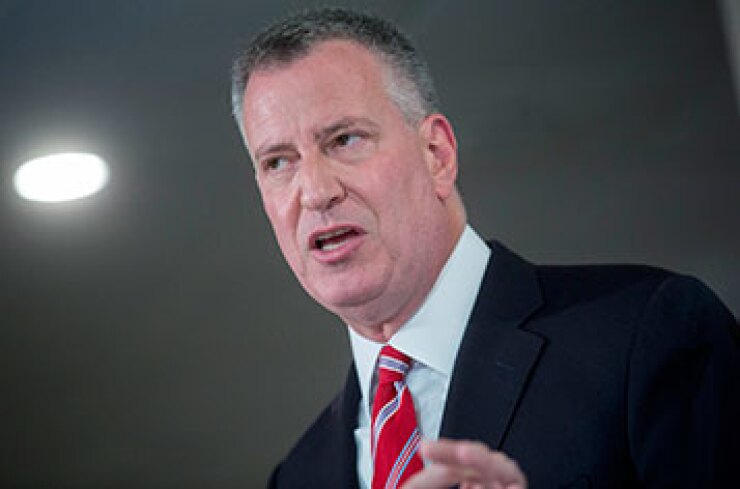New York Mayor Bill de Blasio released his $84.86 billion fiscal 2018 executive budget on Wednesday with a warning that the fiscal climate is "plagued with uncertainty."
"The city's future depends on investing the right priorities today, which is exactly what this budget does," de Blasio told reporters at a late-afternoon briefing in the City Hall Blue Room.

De Blasio said the spending plan has the largest reserves in city history. It includes $1 billion each year in the general reserve, $4 billion in a retiree health benefits trust fund, and $250 million in every year of the four-year capital stabilization reserve plan that de Blasio's administration established.
"This continues the challenge we started four years ago," said de Blasio, who is up for re-election this year. "New Yorkers are struggling to make ends meet, and this budget strives to meet those challenges."
Risks from Washington, he said, include President Trump's budget proposal; possible cuts in federal aid to law enforcement, the Affordable Care Act and Medicaid; programs that support senior citizens and working families; and public housing for 400,000 New Yorkers.
The 10-year capital plan from 2018 to 2027 totals $95.85 billion. "We cannot invest in everything, but we can invest where our dollars will have the biggest impact," he said.
The executive budget marks the latest step in the budget process. The 51-member City Council will hold a new round of hearings and by law, must vote on it by July 1. Last year’s budget materialized one month ahead of schedule.
De Blasio discussed the budget earlier Wednesday with key City Council members, including Speaker Melissa Mark-Viverito and finance committee chairwoman Julissa Ferreras-Copeland.
In its response earlier this month to the mayor’s $84.7 billion preliminary budget, the council added $134 million while calling on the administration to build up reserves as uncertainty about funding from Washington continues to hover.
This parallels comments from bond rating agencies and budget watchdog organizations.
Moody’s Investors Service rates the city’s general obligation bonds Aa2, while S&P Global Ratings and Fitch Ratings rate them AA. All three assign stable outlooks.
The city has $37.8 billion of general obligation debt as of Sept. 30, 2016.
De Blasio said Tuesday he would dedicate $100 million in capital funds to the New York City Economic Development Corp. to fill in one of the last gaps in the Manhattan waterfront greenway, a pedestrian promenade and bicycling path around the island.
A new esplanade will run between East 53rd and 61st East streets in the East River.
“I’m excited and I think everyone is very thrilled to complete the waterway around Manhattan,” said storm financing expert Alan Rubin. “Obviously it’s done with pedestrians in mind and bicyclists in mind.”
Rubin said he hopes waterfront land along the East Side is well-protected.
“The East River is not the same as the Hudson River, no question,” said Rubin, who helped design and underwrite the catastrophe fund for hurricane relief when Hurricane Andrew struck South Florida in 1992. “The currents are worse than on the West Side.”
Earlier this week, de Blasio said the city would offer free, full-day preschool to all 3-year-olds, an expansion of its pre-K program. The mayor said he would seek $700 million from the state and federal governments.
Several transit advocacy groups have criticized the mayor for not including a half-fare subsidy for lower income persons, estimated at about $200 per year.
Some City Council members are proposing a pilot “fair fares” program aimed at college students, homeless people and veterans. They are calling for $50 million in the budget.
"We have responded to the mayor's concerns over cost by developing a phase-in program, meant to ease strains on the city budget, while providing time to get it right," said council member Ydanis Rodriguez, who represents Washington Heights, Inwood and Marble Hill in northern Manhattan.
The dispute has become a political football between de Blasio and the state-run Metropolitan Transportation Authority, which operates city subway trains, buses and two regional commuter rail lines. Each says it's the other's responsibility.
MTA officials say the agency is spending $677 million worth of discounts for Access-A-Ride paratransit riders, students, senior citizens and disabled people.
Gov. Andrew Cuomo, who oversees the MTA, has been silent.
Speakers favoring the discount lobbied on the steps of City Hall in lower Manhattan on Tuesday. They included the city's comptroller and public advocate, Scott Stringer and Letitia James, respectively; Transport Workers Union Local 100 President John Samuelsen and David Jones, president of nonprofit antipoverty agency Community Service Society.
Jones and Samuelsen are also MTA board members.





